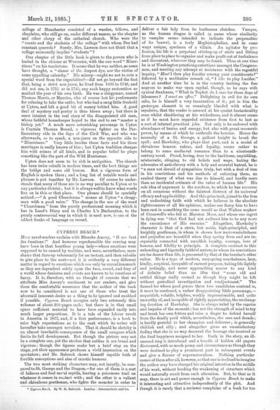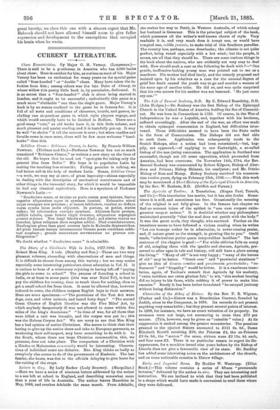CYPRESS BEACH.*
Mosr novel-readers exclaim with Blanche Amory, "Il me faut des emotions !" And however reprehensible the craving may have been in that heartless young lady—whose emotions wore supposed to be caused by realities, and were, nevertheless, mere shams that flare-up vehemently for an instant, and then subside to give place to the next—yet it is evidently a very different matter in regard to emotions which can only be unreal inasmuch as they are dependent solely upon the fuss, sound, and fury of a world whose denizens and events are known to be creations of fancy. It is, therefore, with no thought of censure that we attribute Miss Amory's sentiment to our readers, and give them the comfortable assurance that the author of the book now to be considered is not one of those who treat the • aforesaid innocent desire as a thing to be ignored and snubbed if possible. Cypress Beach occupies only two extremely thin volumes of about 200 pages each ; but there is in that small space sufficient material to have been expanded easily into much larger proportions. It is a tale of the labour revolt in America in 1877, and, if a first performance, is a book to raise high expectations as to the rank which its writer will hereafter take amongst novelists. That it should be sketchy is an almost inevitable consequence of the small compass which limits its fall development. But though the picture may not be a complete one, yet the strokes that outline it are broad and vigorous ; though the figures make but a brief stay on the stage, yet their appearance produces a vivid impression on the spectators; and Mr. Babcock shows himself capable both of forcible conceptions and also of caustic humour.
The two most striking characters may, not inaptly, be compared to St. George and the Dragon,—for one of them is a sort of hideous and foul mo-al reptile, leaving a poisonous trail on whatever it comes in contact with ; and the other is a valiant and chivalrous gentleman, who fights the monster in order to
deliver a fair lady from its loathsome clutches. Vamper, as the human dragon is called (a name whose similarity to vampire seems intended to indicate the propensities of its bearer), is a truly Mephistophelian, and in some ways unique, specimen of a villain. An agitator by profession, his life is a perpetual stirring-up of strife and flitting from place to place to organise and make profit out of turbulence and discontent, wherever they may be found. Thus at one time he is at Washington practising extortions amongst the Congressmen, and meeting any attempt at resistance with the regretful inquiry, "Must I then play Lucifer among your constituents ?" followed by a meditative remark of, "I like to play Lucifer." And at another time he is in the country inciting the free Degrees to make war upon capital, though, as he says with cynical frankness, "What in Tophet do I care for these dogs of labourers ? I want an office." Delighting in evil for its own sake, he is himself a very incarnation of it; yet in him the grotesque element is so cunningly blended with what is repulsive, that the reader is amused at his quaint fantasticality even whilst shuddering at his wickedness, and it almost seems as if he must have regarded existence from first to last as a sort of infernal practical joke. Not only is he endowed with abundance of brains and energy, but also with great mesmeric power, by means of which he enthralls the heroine. Hence the necessity of a St. George, a gallant knight to break the spell ; and Hawksley, who plays that part, and is a model of chivalrous honour, valour, and loyalty, seems rather to belong to some mediasval romance than to a nineteenthcentury novel. Proud, loving, true to the backbone, unyielding, aristocratic, clinging to old beliefs and ways, hating the advocates of anti-slavery with a holy and scornful hatred, he is "a man not devoid of sympathies truly, but with a deal of iron in his convictions and his methods of enforcing them, an exalted theory of what was due to himself, and hardly more than an incidental estimate of the value of human life." His sole idea of argument is the revolver, to which he has recourse on all occasions without the faintest distrust of its universal efficacy and applicability. And this grim trait, joined to the firm and undoubting faith with which he believes in the absolute righteousness of all his opinions, makes one fancy him to have been cast in something the same mould as that Walton nephew of Cromwell's who fell at Marston Moor, and whose one regret in dying was "that God had not suffered him to be any more the executioner of His enemies." Altogether, Hawksley's character is that of a stern, but noble, high-principled, and knightly gentleman, in whom is shown how narrowmindedness and prejudice are beautiful when they spring from and are inseparably connected with unselfish loyalty, courage, love of honour, and fidelity to principle. A complete contrast to this unbending and bigotedly faithful nature, to whom its convictions are far dearer than life, is presented by that of the heroine's other suitor. He is a type of modern, easy-going nonchalance, lazy, kindly, sceptical, incapable of earnest purpose, taking life lightly and jestingly, and never approaching nearer to any kind of definite belief than an idea that "some old and settled things really seemed as though they might be left without periodical investigation and readjustment." The damsel for whose good graces these two candidates contend is, it must be confessed, a rather disappointing little personage,— coquettish, volatile, helpless, weakly impressionable, and quite unworthy of, and incapable of rightly appreciating, the unchanging devotion of Hawksley. She is always ruled by the caprice and impulse of the moment ; has not the strength of mind to try and break her own fetters and raise a finger to defend herself from the deadly peril which, nevertheless, she sees and dreads ; is hardly grateful to her champion and deliverer ; is generally childish and silly ; and altogether gives an unsatisfactory feeling that she in no way deserved the homage she received or the final happiness assigned to her. Early in the story, an illomened ring is introduced and a bundle of hidden old papers discovered, with as much pomp and circumstance as though they were destined to play a prominent part in subsequent events and give a flavour of supernaturalism. Nothing particular comes of them after all, however, so that one is inclined to imagine the author may have changed his original intention in the middle of his work, without heeding the weakening of structure which would naturally result from such alteration. Bat, be that as it may, there is art and power enough in Cypress Beach to make it interesting and attractive independently of the plot. And though it is rarely that a reviewer complains of a book for too
great brevity, we close this one with a sincere regret that Mr. Babcock should not have allowed himself room to give faller expression and development to the conceptions that occupied his brain when he wrote.



































 Previous page
Previous page